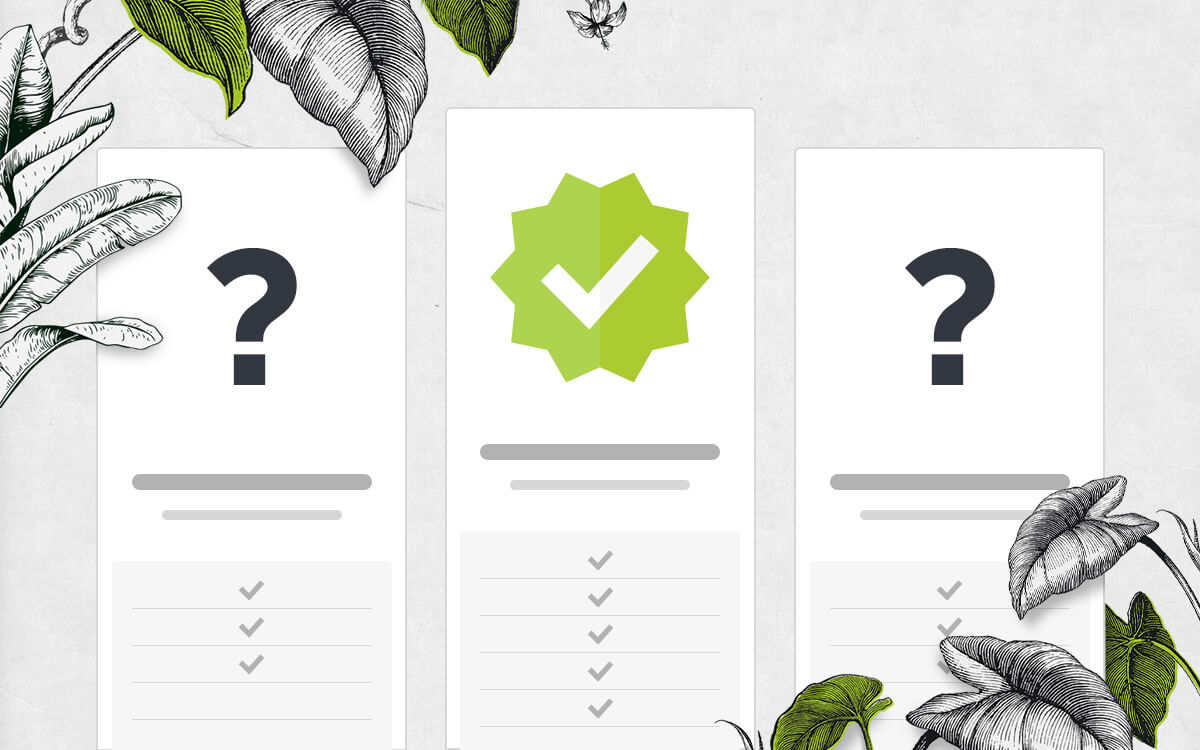Comparing Apples-to-Apples: How to Select the Right Digital Partner

If your organization is relying on a traditional RFP process for your project, you will most likely hit that wall where you have to start comparing apples-to-apples. This can be challenging when it's a blind RFP process or your team hasn't provided enough requirements to allow potential providers to provide a qualified response.
We understand why organizations believe an RFP process is a good approach – at the end of the day, it all comes down to mitigating risk, right? It is hard to measure the quality of an idea or product that has not yet been delivered. You're possibly afraid of wasting time and money. Maybe you're afraid your job is on the line. These are all qualified and legitimate.
Side note: we believe there is a better way and always prefer a candid conversation over an uninformed, less intimate and less informed RFP approach.
Regardless of your approach, let's dig in to some ways you can more easily compare apples-to-apples and help you understand how you might actually need a banana (that's us) instead.
Meet with agencies in person. Do it before proposals are submitted.
If your team is simply comparing one RFP to another without physically speaking with agencies in person or otherwise, you're missing a BIG opportunity to really get a feel for your potential digital partner and let them get a feel for you and the project. Meeting in person with agencies gives them the ability to ask questions about the organization and project and explore the opportunity to make sure it's a good fit for them and allows them to put their best approach forward.
A couple of things to keep in mind:
- Dedicate at least one (1) hour with a 15-30 minute buffer. This will ensure there is enough time for all questions (on both sides) to be answered and the agency will have enough information to ensure a thoughtful and qualified response. The extra buffer is there just in case you feel a connection and the conversation is one that is too good to cut short.
- You should be doing most of the talking. If the agency is using the first meeting to show you all of their previous work and is doing all of the talking, it means they aren't dedicated to understanding what you're trying to do and using their time wisely to uncover any unsaid/unwritten concerns or issues your business may have.
- Take note of clarity. How clear were the questions? How clear were their answers? Did you have a clear understanding of if they might be a viable partner?
The devil's in the detail, so ask for it.
One of the biggest things we find is that prospects (that's you) are rarely given enough detail by firms (not us, the other guys) to truly understand the nuts and bolts that will be delivered with the project. Many times, these are swept over to avoid confusion, hide the fact that they are simply outsourcing, don't really understand the details themselves, or don't have a clear process to guide you and your team.
Here's a list of things to be clear on when reviewing options:
- How much research is included? What kind? What is the value of their strategy to your business/project?
- What does strategy mean to each agency and what is included?
- How does the agency ensure the mobile experience works for both stakeholders and users?
- How many rounds of feedback are included and how are they managed?
- How experienced is the project manager?
- How experienced is the staff?
- Is the staff full time, outsourced, white labeled, etc.?
- If accessibility is a requirement, how much experience does the firm have and how does that impact the overall project?
- How does the agency play to empower you to make most of the ongoing site updates yourself?
- What kind of SEO is included in the site build out?
- How does the firm ensure your current SEO equity isn't lost during the project?
- What are the testing and QA (quality assurance) processes like?
- How much training is included?
- What happens after launch?
- Is the agency staffed to handle ongoing support, enhancements, and growth of your business?
As a word of advice, ensure these are properly answered during your conversations. Simply shoving these into your RFP will result in fewer responses AND more for your team to read and absorb.
Understand the process.
This one is pretty straightforward. When an agency can clearly explain to your team how they approach a project like yours, what their process is, how much your team will be involved and where, and how they have followed the process before and achieved great results you will get a very clear view on how they work, how much they know, and how well you'll be able to work with them.
- If the process doesn't make sense, ask questions. Lots of questions.
- If the agency scrambles to find answers, this may not be their specialty and may not be a good fit.
- If the agency is pressuring you to move forward before you're ready, walk away.
- If the agency says "yes" to everything you ask, be cautious.
Most projects take can take anywhere from 4-8 months, so know ahead of time that you'll be working with the selected partner for a while. You'll know that you've found the right partner when you have a great rapport, laugh, feel safe in asking "stupid" and tough questions, and are challenged (but not pressured) in your thinking.
Look at the size of the firm.
Let's cut to the chase – bigger things cost more than smaller things. The same is traditionally true for specialized firms who provide more longterm accountability and value than firms that outsource all or some portions of the project. The size of the firm will have an impact on the overall project cost, so to best compare apples-to-apples, we would advise comparing equally sized firms who have handled equally sized projects and handle those projects in a similar fashion.
As an example, if you are speaking with Firm A who has 5-10 people and small a portfolio of relatively small projects and/or don't include a deep discovery process for their projects, they are certainly going to be less expensive than a larger firm of 10+ who have larger clients with equally larger challenges that require more upfront research and discovery.
Look at the focus of the firm.
Digital used to be a differentiator 20 years ago, but now it seems like even traditional advertising and branding companies offer some kind of digital component. In our experience, when digital is an afterthought or an add-on for firms, it means they want to include it to not miss out on opportunities, but don't truly have the staff or process required to get the best results.
Semi-related personal aside - I love pizza and I love salads. One thing I don't do, however, is order salads at pizza places OR order pizza at salad places (can I get an "Amen!")?. The salad is offered there to help sell more pizza, but we all know that it's not going to be a great salad. The same is true for firms who don't specialize on digital. They offer digital as a service to help give the illusion of full service, but technically their digital is going to come with stale croutons.
Hire the right firm for the job, even if that means you need two specialist firms who can come to the table and offer you the best of both worlds.
Understand who will be working on your project.
It is very important to know if your project will be handled in-house by dedicated staff or executed by hired help. A firm with full-time staff is going to require a larger investment traditionally as that staff is going to be more experienced, consistently thinking about your challenges, and are normally much more accountable for the results as they'll be helping support the projects after launch.
It is very easy these days to outsource things to chop shops, offshoring companies, and single discipline implementors and while these options are indeed less expensive, they do not look at your project with a broader vision of how it will impact your business, your users, and the staff who will be managing the site post-launch.
Custom vs canned.
Every strategy and design that comes out of Monkee-Boy is 100% custom because we want your new site to be unique to your brand, business, culture, users, and goals. Your new site should fit like a glove, plain and simple. This thoughtful approach takes more time to plan and craft and therefore can be more expensive than firms who start with an existing or canned template.
As an example, it is very easy and cheap to buy a prebuilt template and get it up and running. This isn't necessarily right or wrong, it's simply an option for you to consider. Firms are not always forthright about using templates as crutches to handle your needs, so it's important to ask to help you identify the differences in investment and value. The end result of starting with a template is normally less expensive, true – however, it is also normally more limiting in the long term as the future goals are not considered which makes enhancements and changes challenging. Templates normally "do what they do" and not much more.
Another thing to speak with your candidates about is open source vs custom solutions. This normally relates to two specific items: your CMS selection and the functionality that is integrated within the CMS. Open source is great (we use it all the time), but custom solutions can be a no-brainer when you really want to differentiate and avoid compromises that may arise with OTS (off-the-shelf) solutions. So explore both with your candidates and see how they approach the backend components and advanced functionality to get a better understanding of the long-term impact on your project.
Longterm support and sustainability.
This one is very simple. If you look out1-2 years in the future after the project has been launched would that agency still be around to help you? A good digital partner doesn't necessarily need to provide service each month but should be there to support you when you need them most. Some helpful questions to ask:
- How can the agency help you after the project is over?
- What are their post-launch offerings?
- What is their post-launch process?
- How are they staffed to handle things?
- How many clients do they currently support?
- How do they assist with ongoing site hosting, security, and enhancements?
No vs Yes.
At the end of the day, the best partner for any project is one that is going to say "no" from time-to-time. Welcome this – it should help build trust and show they have integrity. A "yes man" signals that you've found a vendor and not a partner.
- If they're not a good fit for your project, they should tell you so, tell you why and help you find a better fit.
- If they disagree with an idea, they should ask questions and help weigh options, not simply execute blindly.
- If they ask you to do something outside of their core competency, they should let you know or, again, help you find a better fit.
If you have a fixed budget, tell them.
In most cases, exposing your budget keeps everyone from shooting in the dark -- it doesn't mean agencies are going to max it out.
As an example, one of our first, large clients was a laboratory sciences company. They told us what they wanted, their goals, post-launch needs and that they had a $100K budget. We came back with 3 options on how they could approach the project and they were thrilled. They settled on a $60K initial project investment which allowed them to use the remaining $40K for ongoing marketing and maintenance needs. We supported them for 12 years until they were acquired by LabCorp.
Being open about your budget allows you to get qualified responses from agencies who can work within your budget and help remove price tags as the only primary apple in your comparison metric. It should also speed up the qualification process and quickly allow agencies to either say "This might be a good fit, let's chat." or "We can't build it for that, but we know someone who might be able to help." or "We can't necessarily build everything on our wish list, but we here are some options we can consider."
I hope this helps with the fruit basket comparison. If you have a digital project and would like to chat, we'd love to walk through all of the above with you and see if we're a good fit. And as recommended, if we're not we'll let you know and help you find a good home.
Latest Articles

Unpacking the Website Upgrade Dilemma: Replatform, Refresh, or Redesign?
Is your website feeling a bit... prehistoric? In the ever-changing digital landscape, staying relevant is key to survival. This article explores three paths to a better, high-performing digital experience: website re-platforming, refreshing, and redesigning.
Continue reading
Lessons from the Trenches: Debunking The Myths About WordPress
WordPress has attracted much attention over the years as a popular and influential content management system. Unfortunately, with that attention comes a lot of misinformation and myths. Today, we're going to debunk the top 10 WordPress myths.
Continue reading